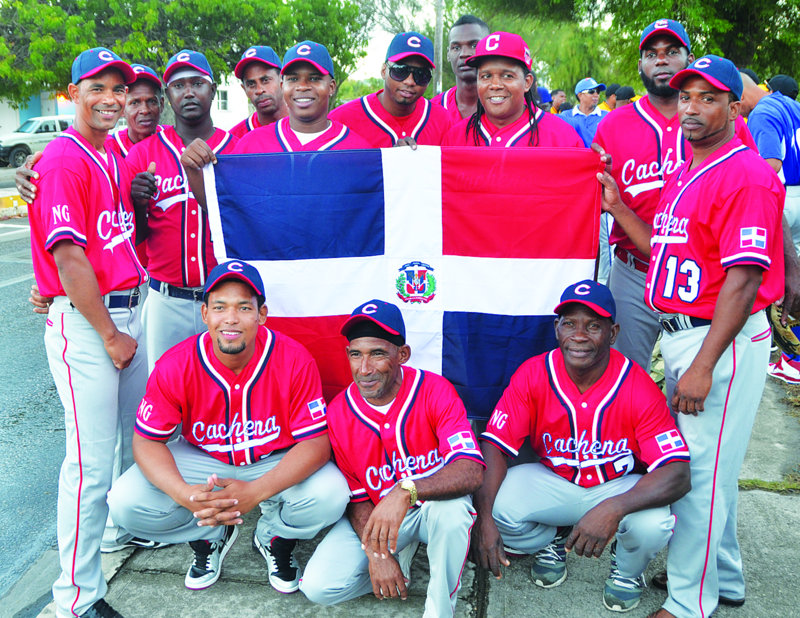
Fun, flair and atmosphere made for an evening that will not be easily forgotten by the 4A Band 1 English B class of the Albena Lake-Hodge Comprehensive School.
It is Wednesday 25 February. The sun is setting in ‘Umofia, Igboland, Nigeria’ – er not quite – for it is Sandy Ground, Anguilla, on the grounds of the elegant, historical Methodist Manse. But one can be forgiven for the mistake because with the flaring torches around the perimeter of the grounds, the intermittent beat of the drums, the drifting smoke bearing accents of roasted meat, and persons spectacularly outfitted in Afrocentric wear, the scene recalls another time in a very faraway place. In reality, this is an English B class project, spectacular in its expression.
Under the passionate tutelage of Ms Maris Edwards, the literature text ‘Things Fall Apart’, takes on life as the students celebrate the ‘uri’ of Akueke and Ibe (two characters in the novel). The ‘uri’ is the village celebration after the bride price has been decided. Ms Edwards in speaking on the evening’s activity said, “We are having a class project based on ‘Things Fall Apart’ by Chinua Achebe. It is set in tribal Africa in the late 1800s just before the arrival of the European missionaries… For the class project, the students have to execute the uri… In December, all of them received an invitation to attend the uri, and here we are dressed in African wear.”
The students organised two movie evenings and sold snacks and water at school. Students also helped to organise the programme for the evening. The menu for the ‘uri’ was chosen by the students based on traditional Igbo food and included yam (a major Igbo crop), plantain, and salted fish. It was a true feast as everyone ate to their hearts content and much was left over.
The class was divided into 5 clans when the novel was introduced, and they have been competing since then for points in various class activities. Ms Edwards commented, “It is so refreshing to see them reading the novel while waiting in line before class begins. They want their clan to win in the quiz for the day. We call it ‘intellectual wrestling’ because wrestling is the main sport of the Igbo.”
Ms Edwards said, “This project is not only to build relationships and memories but is also intended to change their perceptions about Africa by opening them up a little bit to a different culture and to diversity by giving them another kind of experience.”
The students explained that this is their attempt to “embrace the African culture.” They gave further details on the inner workings of their class organisation: each clan has a name (with a meaning); there is an elder in charge of each clan, and they began the evening with points and that the competitions that evening would be for more points. There were three clan competitions: Parade of the Clans, Village Griot Competition and Interviews. The Village Griot Competition required that each clan compose an original folktale and select a griot (storyteller) who would tell it to the audience. The Interview segment required students to respond to questions about their favourite quotation by Chinua Achebe and why; one aspect of the Igbo culture they admire most or that we could adopt in Anguilla. Another question asked how their perceptions of Africa have been influenced by the novel. At the end of the evening, it was the delight of the clan in last place to know that they came out ahead of everyone else.
The whole affair was the work of the village. Parents were extremely helpful in supporting the fundraisers and preparing their children for the event; Dr. Oluwakemi Banks chaired the evening; Ms. Nolda Fyffe and Mrs. Wendy Theodore prepared the ‘Igbo’ fare; the Board of the Elios Center willingly lent the premises.
The class is also indebted to the Director of AXA Taekwondo, Gregory Permuy, for lending his gym free of charge to host the movie evenings. And there are still more villagers to thank.
In commenting about the text, the students said, “What we used to hear is that the Africans were barbaric and savage-like,… but the author of ‘Things Fall Apart’ Chinua Achebe, wrote the book in such a way as to make us, the readers, know that the Africans are just like anyone else.”
‘Things Fall Apart’ challenges Western perceptions of the African. Besides the uri, students of 4A have been engaged in other activities to stimulate their interest in the Motherland and in literature. One student puts it, “Now I care about English B”.
Ms Edwards describes the book as a ‘Literary Heavyweight’ as it has been translated into more than 50 languages and there are over 8 million copies in print. She thinks it is a privilege for the students to study an African novel of such international renown. Through the teaching of English A and B, she hopes to help widen the lens and deepen the perspective of their world view. Her desire is to teach them to be critical thinkers and great communicators. She wants them to love books and love learning, for, according to Ms. Edwards, “Everything you need to know is in a book.”








